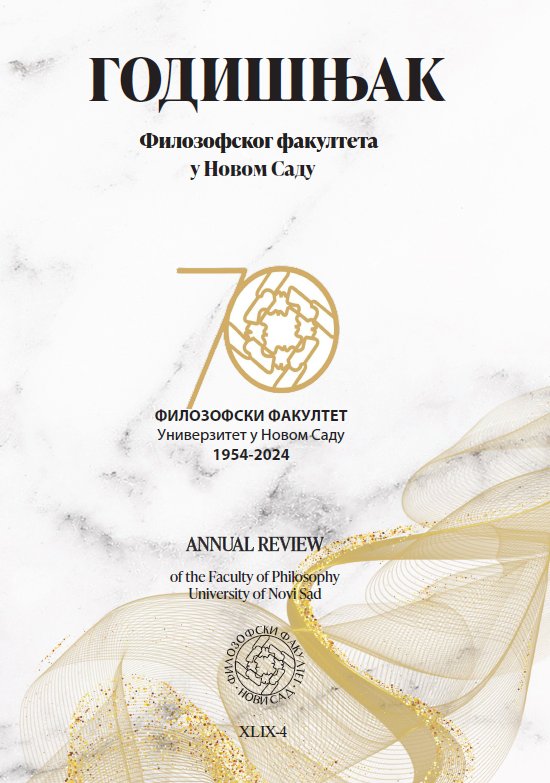THE NAME OF THE ROSE BY UMBERTO ECO AS A POSTMODERN (ANTI)DETECTIVE NOVEL
Main Article Content
Abstract
The paper analyzes the novel The Name of the Rose (1980) by Umberto Eco in the context of postmodernism, (re)examination of the conventions of the crime genre, as well as defining the modern type of professor’s novel in which we recognize Eco as a writer and scholar of medieval cultural, philosophical and literary history. The main hypothesis on which the research is based is that the professor's novel uses elements of the crime genre in order to play with it within the postmodern experiment. The research aims to prove that in postmodern prose, the middle ages are not viewed through the prism of modern prejudices about that age, but through the factual knowledge of medieval culture scholars and the position of otherness - the silenced voices of the middle ages, which usually have no place in literature. The inclusion of the marginal, the hero's constant questioning of the dogmas of the world he belongs to, the struggle of binary oppositions - good and evil, God and Satan, science and religion, the center and the ex-centric, enable postmodern uncertainty. Umberto Eco's novel successfully synthesizes ideological foundations and genre conventions, such as postmodernism, crime and professor’s novel. In a novel built on internal paradoxes, the author's scientific interest in the middle ages enables the intellectualization of the criminal genre, while the criminal genre allows changing the perspective from which we observe the middle ages, under the influence of new scientific knowledge. The character of William of Baskerville, a franciscan monk, former inquisitor and detective, is based on a combination of literary and philosophical models, while the criminal is the blind librarian Jorge, a tribute to Borges. The classic discovery of the killer by the detective's logical abilities does not occur, but rather the disintegration of the world that the killer was trying to protect. The criminal is the mask of the medieval world, while the detective is his opposite - a renaissance personality, who does not act like an inquisitor, but bases the investigation on facts and assumptions. Although it betrays the conventions of the genre on which it is based, the novel The Name of the Rose shifts the horizon of the audience's expectations, constructing the reader as its prey and accomplice. The Name of the Rose becomes both a bestseller and an object of academic study, and instead of immediate consolation, the reader receives intellectual entertainment, a murder mystery set in the 14th century, among monks, manuscripts and reliquaries.
Downloads
Article Details

This work is licensed under a Creative Commons Attribution-ShareAlike 4.0 International License.
References
Bajar, P. (2010). Anticipirani plagijat. Beograd: Službeni glasnik.
Batler, K. (2012). Postmodernizam: sasvim kratak uvod. Beograd: Službeni glasnik. Black, J. (1999). (De)feats of Detection: The Spurious Key Text from Poe to Eco. U: P. Merivale & S. E. Sweeney. (Ed.) (1999). Detecting Texts: The Metaphysical Detective Story from Poe to Postmodernism. Philadelphia: University of Pennsylvania Press. 75–100. DOI: https://doi.org/10.9783/9780812205459.75
Dojl, A. K. (2005). Šerlok Holms. Crvena nit. Novi Sad: Vega media.
Eko, U. (2004a). Ime ruže. Beograd: Kompanija Novosti AD. (štampano ćirilicom)
Eko, U. (2004b). „Postile uz Ime ruže”, u okviru: Eko, 2004a. (štampano ćirilicom)
Hačion, L. (1996). Poetika postmodernizma: istorija, teorija, fikcija. Novi Sad: Svetovi.
Kraus, O. (1884). Der Professorenroman. Heilbronn: Henninger.
Kurcijus, E. R. (1996). Evropska književnost i latinski srednji vek. Beograd: SKZ.
(štampano ćirilicom)
Lasić, S. (1973). Poetika kriminalističkog romana: pokušaj strukturalne analize. Zagreb: Liber– Mladost.
Marićević Balać, J. (2019). Let kroz predele Pavićeve Vizantije. U: J. Marićević Balać (Ed.) Milorad Pavić. Novi Sad: Izdavački centar Matice srpske. 7–24. (štampano ćirilicom)
Le Goff, J. (1982). Intelektualci u srednjem vijeku. Zagreb: GZH.
Le Goff, J. (1998). Civilizacija srednjovjekovnog zapada. Zagreb: Golden marketing.
Papić, V. (2023). Književni lik kao posrednik srednjovekovne estetike: Eko – Pavić – Pamuk. Zbornik Matice srpske za književnost i jezik, 1 (2023), 67–86. (štampano ćirilicom)
Pavličić, P. (1990). Sve što znam o krimiću. Beograd: Filip Višnjić.
Professorenroman (2005). U: Oxford Companion to German Literature (3rd Ed.). Preuzeto 23. juna 2023. sa: https://www.oxfordreference.com/display/10.1093/acref/9780198158967.001.0001/acref-9780198158967-e-4226;jsessionid=AA50495BACD1F53946E835699A57DA7E?rskey=JqglxN&result=4381.
Volter (2015). Kandid; Zadig; Mikromegas. Beograd: Plato. (štampano ćirilicom)
Žmegač, V. (1970). Aspekt romana detekcije. Književno stvaralaštvo i povijest društva. Zagreb: Liber.




